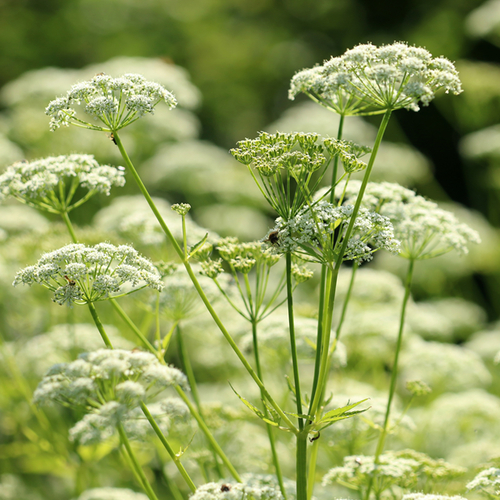
Background
Bishop's weed is used for asthma, chest pain (angina), kidney stones, a skin disorder that causes white patches to develop on the skin (vitiligo), and scaly, itchy skin (psoriasis), but there is no good scientific evidence to support these uses.
Be careful not to confuse bishop's weed (Ammi majus) with its more commonly used relative, khella (Ammi visnaga).
Safety Safety definitions
When applied to the skin: There isn't enough reliable information to know if bishop's weed is safe. It may cause the skin to become extra sensitive to the sun. This might put you at greater risk for skin cancer. Wear sunblock outside, especially if you are light-skinned.
Special Precautions & Warnings:
Pregnancy: It's LIKELY UNSAFE to use bishop's weed if you are pregnant. It contains a chemical called khellin that can cause the uterus to contract. This might threaten the pregnancy.Breast-feeding: There isn't enough reliable information to know if bishop's weed is safe to use when breast-feeding. Stay on the safe side and avoid use.
Surgery: Bishop's weed might slow blood clotting. There is a concern that it might increase the risk of bleeding during and after surgery. Stop using bishop's weed at least 2 weeks before a scheduled surgery.
Effectiveness
- Asthma.
- Chest pain (angina).
- Kidney stones.
- Fluid retention.
- Scaly, itchy skin (psoriasis).
- White patches to develop on the skin (vitiligo).
- Other conditions.
Dosing & administration
Interactions with pharmaceuticals
Medications changed by the liver (Cytochrome P450 3A4 (CYP3A4) substrates)
Interaction Rating=Moderate Be cautious with this combination.
Some medications are changed and broken down by the liver. Bishop's weed might decrease how quickly the liver breaks down some medications. Taking bishop's weed along with some medications that are broken down by the liver can increase the effects and side effects of some medications. Before taking bishop's weed, talk to your healthcare provider if you are taking any medications that are changed by the liver.
Some medications changed by the liver include lovastatin (Mevacor), ketoconazole (Nizoral), itraconazole (Sporanox), fexofenadine (Allegra), triazolam (Halcion), and many others.
Medications that increase sensitivity to sunlight (Photosensitizing drugs)
Interaction Rating=Moderate Be cautious with this combination.
Some medications can increase sensitivity to sunlight. Bishop's weed might also increase your sensitivity to sunlight. Taking bishop's weed along with medication that increases sensitivity to sunlight could increase the chances of sunburn, blistering, or rashes on areas of skin exposed to sunlight. Be sure to wear sunblock and protective clothing when spending time in the sun.
Some drugs that cause photosensitivity include amitriptyline (Elavil), Ciprofloxacin (Cipro), norfloxacin (Noroxin), lomefloxacin (Maxaquin), ofloxacin (Floxin), levofloxacin (Levaquin), sparfloxacin (Zagam), gatifloxacin (Tequin), moxifloxacin (Avelox), trimethoprim/sulfamethoxazole (Septra), tetracycline, methoxsalen (8-methoxypsoralen, 8-MOP, Oxsoralen), and Trioxsalen (Trisoralen).
Medications that slow blood clotting (Anticoagulant/Antiplatelet drugs)
Interaction Rating=Moderate Be cautious with this combination.
Bishop's weed might slow blood clotting. Taking bishop's weed along with medications that also slow clotting might increase the chances of bruising and bleeding.
Some medications that slow blood clotting include aspirin, clopidogrel (Plavix), diclofenac (Voltaren, Cataflam, others), ibuprofen (Advil, Motrin, others), naproxen (Anaprox, Naprosyn, others), dalteparin (Fragmin), enoxaparin (Lovenox), heparin, warfarin (Coumadin), and others.
Interactions with herbs & supplements
Herbs that might increase sensitivity to sunlight: Bishop's weed seems to increase sensitivity to sunlight. Taking bishop's weed along with other herbs, such as St. John's wort, that also increase sensitivity to sunlight could increase the chances of sunburn, blistering, or rashes on areas of skin exposed to sunlight.


